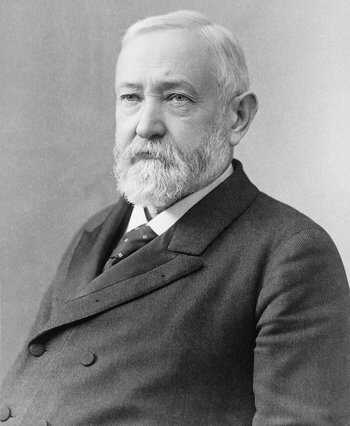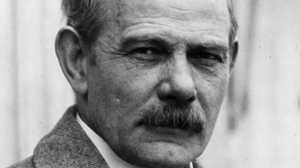23rd President

Terms: 1889-1893
Political Party: Republican
First Lady: Caroline Lavinia Scott Harrison
Vice President: Levi P. Morton
Overview
Born: August 20, 1833, in North Bend, Ohio... Grandson of William Henry Harrison, Benjamin Harrison managed to unseat Grover Cleveland in the 1888 election. His economic policy may have contributed to the depression that hit the country after he left office, but his social and foreign policies were visionary and bold. Harrison's concern for the enfranchisement of African Americans and his wielding of the American navy as a tool of coercive diplomacy foreshadowed the concerns of the 20th century... Died: March 13, 1901.
The Era
1889: The Eiffel Tower is constructed (1889)
1890: Louis Sullivan's Wainwright Building in St. Louis revolutionizes skyscraper design (1890)
1891: James Naismith invents basketball (1891)
1892: Ellis Island is established to process new immigrants (1892)
Arthur Conan Doyle publishes The Adventures of Sherlock Holmes (1892)
1893: Chicago hosts the World's Columbian Exhibition (1893)
Domestic Policy
Harrison signed the Sherman Antitrust Act of 1890 into law — as funded and administered, the legislation had no teeth, but it established the goal of a check on corporations that later presidents like Theodore Roosevelt could exploit more fully. More dire results came from a higher tariff and the introduction of silver coinage. Both of these policies probably hastened the Panic of 1893. Harrison supported bills that promoted voting rights of African Americans in the South, but could not get them through Congress. He appointed Frederick Douglass, the most famous African American of the day, as ambassador to Haiti.
Foreign Affairs
International affairs engaged Harrison's administration more than any president since Lincoln. The first Pan-American conference was held in 1889. In the Pacific, Harrison established Samoa as an American protectorate with Germany and England as partners, and tried to annex Hawaii following a revolution (the Senate rejected the annexation). To the south, the president did not hesitate to use the new armored navy to pressure Chile to pay reparations for harm done to American sailors in Valparaiso. To the north, he negotiated with Britain and Canada to regulate seal hunting in the Bering Sea. Although he endorsed protectionist tariffs in general, Harrison negotiated reciprocal trade agreements that set the pattern for American trade policy in the years to come.
Presidential Politics
For the election of 1888, Harrison ran a "front porch campaign." Staying at home in Indianapolis, he would speak extemporaneously to any groups that came calling on him. Cleveland won the popular vote, but Harrison carried the electoral college. During a rematch four years later, Cleveland was returned to the White House.







